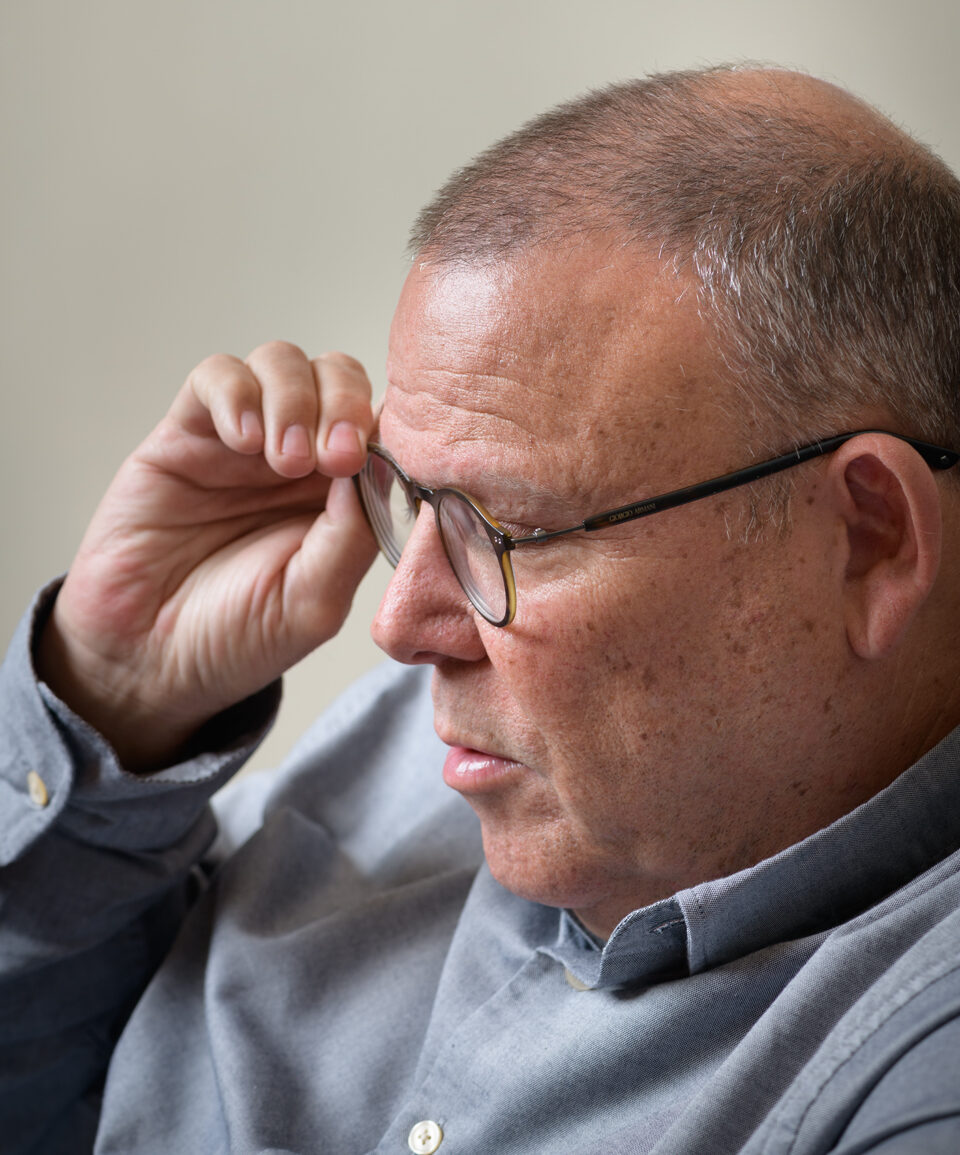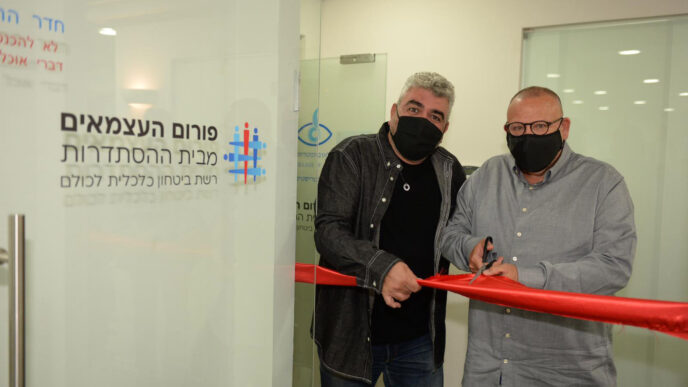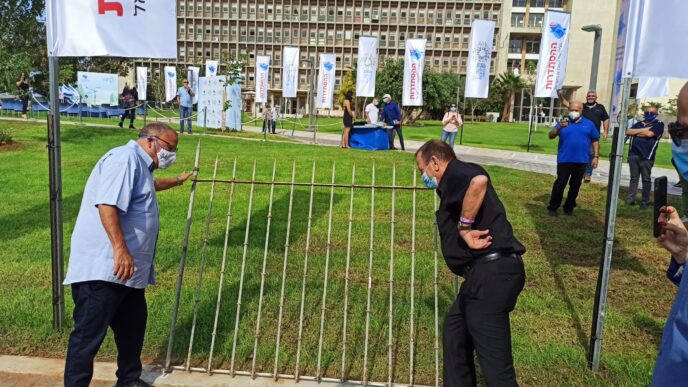|
Ocnus.Net Dysfunctions "We see the strength of the unions, and we can be proud of the fact that we helped keep peoples' sanity in these insane times" | "20 years ago, we thought that younger people would never be interested in our organization. Today, that’s no longer the case” “There’s no doubt that we are currently living through one of the worst crises in our history, both as a country and as a union,” said Arnon Bar-David, chairman of the Histadrut, describing the harsh reality that Israel’s largest union finds itself in on its 100th anniversary. But Bar-David, 63, believes that the pandemic has also presented Israeli unions with opportunities, in the midst of enormous challenges. Davar sat down with Bar-David to understand more about his vision for the Histadrut. 
Bar-David:"Today, unions respect the leadership because they know that I come from where they come from." (Photo: Yonatan Blum) What keeps the Histadrut going? “The fact that people can be sure to be taken care of here is the magic of the Histadrut. It’s the source of our strength, and that can’t be given up on. It really doesn’t matter which party you vote for or what your ethnic background is, at the end of the day, we all work. That’s why the union is still so relevant,” Bar-David said. “The coronavirus crisis is a crisis on the level of Israel’s historical wars,” he continued. “We’ve had internal crises too. We almost collapsed as an organization in the past. But we’ve managed to navigate the storms and reinvent ourselves time and time again.” From Kiryat Shalom to ArlozorovBar-David spent his childhood years in a working-class community in Kiryat Shalom, a neighborhood in south Tel Aviv. His father worked as a mechanic for the municipal water company, and his mother was a typist. “I had an amazing childhood,” he said. “Our community was very diverse. Israeli born and immigrants from all over the world. We were all equal, no one was rich or poor.” After several years working in the municipality’s education department, Bar-David was chosen to be the head of Tel Aviv municipal workers union, which organized about 14,000 employees. One of Bar-David’s major campaigns was against the introduction of private contract labor into the municipal sanitation department. “Trash was piled up for weeks. We organized huge demonstrations, until management dropped the whole idea. We did it on our own, without help from the Histadrut.” Bar-David is one of the first Histadrut chairs to have risen to a leadership position from inside the organization, and not from the Avodah political party. “When I was at the municipal workers union, we didn’t always pay attention to the Histadrut leadership,” he said. “Today, unions respect the leadership because they know that I come from where they come from.” “As soon as I took this job in March 2019, I told the members of our organization that they have to be proud of who they are. I told them that we have to be proud in our organization. I think that we’ve seen this in the current crisis.” How? The Minister of FinanceAs opposed to his predecessor, Bar David has had to deal with a Minister of Finance who is known to be opposed to trade unions. Just a few months after taking office, Israel Katz began a public campaign calling for a pay reduction in the public sector, during one of the worst economic downturns in Israeli history. During the negotiations, which were held over the summer, Katz surprised the Histadrut with an ultimatum, demanding the unions accept the pay cut. In response the Histadrut threatened a strike, and Katz backed down. 
Minister of Finance, Israel Katz (Photo: Olivia Pitusy) “I believe in running the economy by committing to dialogue between all parties. Unfortunately this isn’t the case with our current government. “We currently have a minister of finance whose main concern is himself, posting and tweeting megalomaniac photos and attacking everyone over social media. That’s really not the way to run the economy. “We can be cooperative, we can assist the government when it needs our help. But in return I want to see positive policy, I want to see responsibility, I want to see an approved budget. Then we can talk. At the moment the feeling is that there’s no one to talk to, no one to make a deal with. Negotiations between us and the Ministry of Finance aren’t going anywhere.” What have you got to say to those workers who have lost their job? “That leaves about 200,000 who won’t find a job, on top of the 200,000 unemployed people before the pandemic. It’s important to remember that most of those workers who have been put on unpaid leave because of the pandemic will return to work.” Workers and the self employedAfter decades of tension between the Histadrut and self-employed workers, or freelancers, in Israel, Bar-David has recently founded a freelancers’ union in the Histadrut, and sees it as the most important thing he has done since taking the position. 
Bar-David cutting the ribbon in the new freelancers’ union office in the Histadrut (Photo: Histadrut) “Getting the self employed involved in the unions is part of the major changes we want to be doing in the coming years. Self-employed workers receive very little support, so we want to back them this time. “At the moment we’re working on a plan for unemployment benefits for freelancers. The most important thing is to offer them a safety net in times of crisis. “We want them to be eligible for up to 10,500 shekels a month, depending on their income. You can never know when we’ll have another pandemic, a war or a recession.” Why should the Histadrut represent self-employed workers? There are freelancers who employ workers themselves. The Histadrut will be relevant for years to comeAs far as Bar-David is concerned, what symbolizes the newly found openness of the Histadrut is the opening of the Histadrut garden in Tel Aviv to the public. For years, the Histadrut headquarters garden on Arlozorov street was fenced off, contributing to the building’s image as closed off and opaque. A few weeks ago the fences were removed, and the garden is now home to a café and a public library, and offers free Wifi. 
Arnon Bar-David and Tel Aviv mayor Ron Huldai taking down the fences surrounding the Histadrut garden in Tel Aviv, October 2020. (Photo: Nizzan Zvi Cohen) Will the Histadrut still exist in 100 years? “Young people are interested in the Histadrut today. 20 years ago, we thought that younger people would never be interested in our organization. But today, that’s no longer the case. We need to make some changes, and we’re working on it. We’re working on making the Histadrut relevant for the decades to come.” Source: Ocnus.net 2020 |